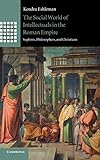The social world of intellectuals in the Roman Empire : sophists, philosophers, and Christians / Kendra Eshleman.
Τύπος υλικού: ΚείμενοΣειρά: Greek culture in the roman worldΠεριγραφή: ix, 293 σ ; 24 εκISBN:
ΚείμενοΣειρά: Greek culture in the roman worldΠεριγραφή: ix, 293 σ ; 24 εκISBN: - 9781107026384
- 305.552 093 7 23
| Τύπος τεκμηρίου | Τρέχουσα βιβλιοθήκη | Ταξιθετικός αριθμός | Αριθμός αντιτύπου | Κατάσταση | Ημερομηνία λήξης | Ραβδοκώδικας |
|---|---|---|---|---|---|---|
![Book [21] Book [21]](https://library.upatras.gr/nereus/nereus-book-yes.png) Book [21]
Book [21]
|
ΒΚΠ - Πατρα Βασική Συλλογή | 305.552 093 7 ESH (Περιήγηση στο ράφι(Άνοιγμα παρακάτω)) | 1 | Διαθέσιμο | 025000254206 |
Includes bibliographical references (pages 263-287) and index.
Machine generated contents note: Introduction; 1. Inclusion and identity; 2. Contesting competence: the ideal of self-determination; 3. Expertise and authority in the early church; 4. Defining the circle of sophists: Philostratus and the construction of the Second Sophistic; 5. Becoming orthodox: heresiology as self-fashioning; 6. Successions and self-definition; 7. 'From such mothers and fathers': succession narratives in early Christian discourse.
"This book examines the role of social networks in the formation of identity among sophists, philosophers, and Christians in the early Roman Empire. Membership in each category was established and evaluated socially as well as discursively. From clashes over admission to classrooms and communion to construction of the group's history, integration into the social fabric of the community served as both an index of identity and a medium through which contests over status and authority were conducted. The juxtaposition of patterns of belonging in Second Sophistic and early Christian circles reveals a shared repertoire of technologies of self-definition, authorization, and institutionalization, and shows how each group manipulated and adapted those strategies to its own needs. This approach provides a more rounded view of the Second Sophistic and places the early Christian formation of "orthodoxy" in a fresh context"--


